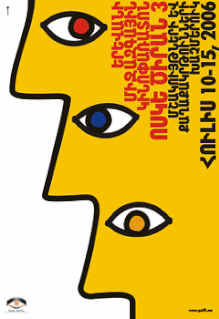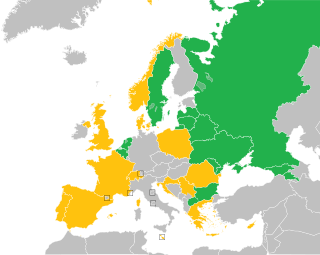 W
WThe 1st Yerevan Golden Apricot International Film Festival was a film festival held in Yerevan, Armenia from June 30 to July 4, 2004. The festival attracted attention from all over the world while including 148 films representing over 70 filmmakers from 20 countries. Grand Prizes of the first Golden Apricot festival went to Atom Egoyan, Stephane Elmadjian and Armen Khachatryan (Documentary).
 W
WThe 3rd Yerevan Golden Apricot International Film Festival was a film festival held in Yerevan, Armenia from 10–15 July 2006. The annual festival presented about 120 films from 43 countries. Participants included some of the most highly acclaimed figures of world cinema - such as Marco Bellocchio, Tonino Guerra, Mohsen Makhmalbaf, Godfrey Reggio and Artavazd Peleshyan, who were honored with Lifetime Achievement Awards. More than 110 foreign guests attended the festival, which included filmmakers, actors, producers and distributors. The festival was covered by a number of international media, including Euronews and Arte. The international juries, headed by Moritz de Hadeln, Godfrey Reggio and Arsinee Khanjian, awarded the following prizes: Golden Apricot 2006 for the Best Feature Film to Hou Hsiao-hsien for his film Three Times, (Taiwan/China/France); Golden Apricot 2006 for the Best Documentary Film to Workingman's Death by Michael Glawogger, (Austria); and Golden Apricot 2006 for the Best Film in "Armenian Panorama" to The Dwellers of Forgotten Islands by Hrant Hakobyan, (Armenia).
 W
WThe 4th Yerevan Golden Apricot International Film Festival was a film festival held in Yerevan, Armenia from 9–14 July 2007. More than 120 films from around the world were presented during the festival with attendance from contemporary filmmakers such as Bruno Dumont, Leos Carax, Carla Garapedian, Lee Chang-dong, Andrey Zvyagintsev, Aurora Quattrocchi and Tchéky Karyo. Paolo and Vittorio Taviani (Italy), directors of The Lark Farm were honored with Lifetime Achievement Awards. The international juries, headed by An Cheong-sook, Martin Schweighofer (Austria), Vigen Chaldranyan (Armenia) awarded the following prizes: Golden Apricot 2007 for the Best Feature Film to Ulrich Seidl for his film Import/Export (Austria); Golden Apricot 2007 for the Best Documentary Film to Vardan Hovhannisyan for his film A Story of People in War and Peace (Armenia) and Golden Apricot 2007 for the Best Film in the “Armenian Panorama” to Screamers by Carla Garapedian (UK). Vardan Hovhannisyan was awarded with the FIPRESCI and Ecumenical Jury Prizes and Carla Garapedian (Screamers) was also awarded the Ecumenical Jury Price.
 W
WThe 5th Yerevan Golden Apricot International Film Festival was a film festival held in Yerevan, Armenia from 13–20 July 2008. The festival had more than 450 submissions from 67 countries; viewers had an opportunity to see over 160 films. Among the honorable guests of the festival were Wim Wenders, Enrica Antonioni, Goran Paskaljevic, Dariush Mehrjui, Catherine Breillat, and others. A Special Tribute was paid to Michelangelo Antonioni by honoring him with a posthumous Parajanov’s Thaler. Additionally, Wim Wenders and Dariush Mehrjui were honored with Parajanov’s Thaler Lifetime Achievement Awards. The main prizewinners of the 5th Golden Apricot were Anna Melikian from Russia for her film The Mermaid, Meira Asher from Israel for the film Women See Lot of Things, and Eric Nazarian from the USA for The Blue Hour. The FIPRESCI Award went to Huseyn Karabey with his film My Marlon and Brando and the Ecumenical Award to Eric Nazarian with his film The Blue Hour.
 W
WThe 6th Yerevan Golden Apricot International Film Festival was a film festival held in Yerevan, Armenia from 12–19 July 2009. The annual festival had over 450 submissions from 67 countries, 150 of which were included into the competition and non-competition programs. Over 250 accredited press representatives covered the festival. This was the fourth year the festival was widely covered by Euronews. Among honorable guests were filmmakers Rob Nilsson, Kohei Oguri (Japan), Alexander Rodnyansky (Russia), Sergei Solovyov (Russia), actors Eric Bogosian, Arsinee Khanjian (Canada) and producer Alain Terzian. The international juries, headed by Kohei Oguri, Alexander Rodnyansky, Haig Balian (Netherlands) awarded the following prizes: Golden Apricot 2009 for the Best Feature Film to George Ovashvili for his film The Other Bank (Georgia); Golden Apricot 2009 for the Best Documentary Film to Anders Østergaard for his film Burma VJ - Reporting from a Closed Country (Denmark), and Golden Apricot 2009 for the Best Film in the “Armenian Panorama” to With Love and Gratitude by Arka Manukyan (Armenia). The FIPRESCI Award went to Ozcan Alper’s Autumn and the Ecumenical Award to George Ovashvili’s The Other Bank.
 W
WThe 7th Yerevan Golden Apricot International Film Festival was a film festival held in Yerevan, Armenia from July 11 to 18, 2010.
 W
WYerevan City Council election was held on May 5, 2013. The Republican Party of Armenia won 56% of the total vote, Prosperous Armenia had 23%, while Barev Yerevan won over 8%. The opposition parties and the local observers denounced the elections as "unfair".
 W
WThe 2nd Yerevan Golden Apricot International Film Festival was a film festival held in Yerevan, Armenia from 12–17 July 2005. Entries were submitted from 45 countries such as Russia, Argentina, the Netherlands, Afghanistan, Malaysia, Chile, Turkey, Finland, India, Israel, Iran and Canada. Following the selection, 144 films from 37 countries were included into competition and non-competition programs. Included amongst the guests and participants were some of the most highly acclaimed figures of world cinema such as Abbas Kiarostami, Krzysztof Zanussi, and Nikita Mikhalkov who were given Lifetime Achievement Awards. The main prizewinners of the 2nd Golden Apricot Festival were Alexander Sokurov, Russia, with his film The Sun, Pirjo Honkasalo, Finland, with The 3 Rooms of Melancholia, and Arman Yeritsyan, Armenia, with Under the Open Sky.
 W
WThe Junior Eurovision Song Contest 2011 was the ninth edition of the annual Junior Eurovision Song Contest, and took place in Yerevan, Armenia at the Karen Demirchyan Sports and Concerts Complex. It was the first time in history of the Junior Eurovision Song Contest that the contest was held in the previous year's winning country. Public Television of Armenia ARMTV was the main organizer of the show, being provided financial aid from the European Broadcasting Union made of entrance fees from the participating broadcasters, while Swedish company HD Resources assisted with the technical side of the production.